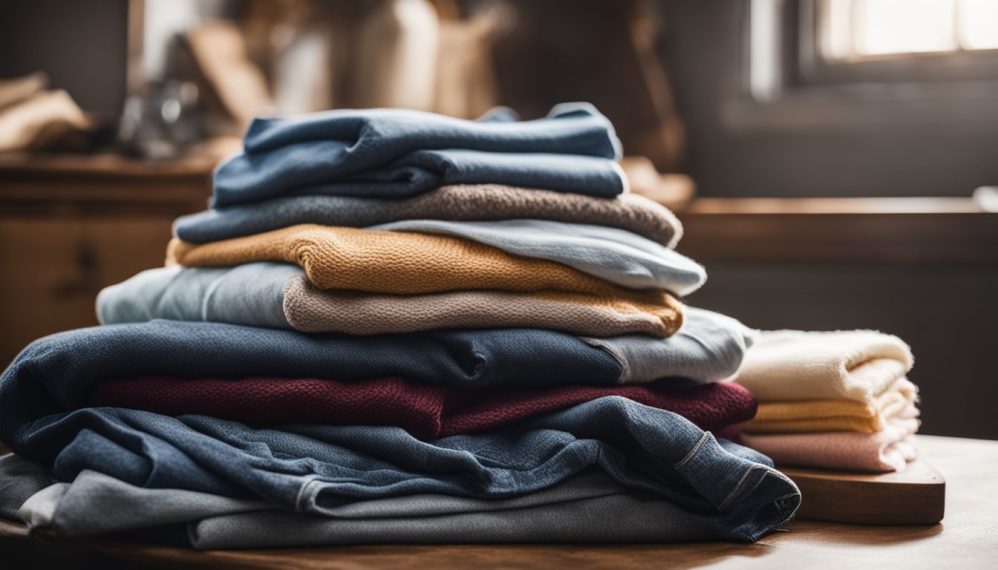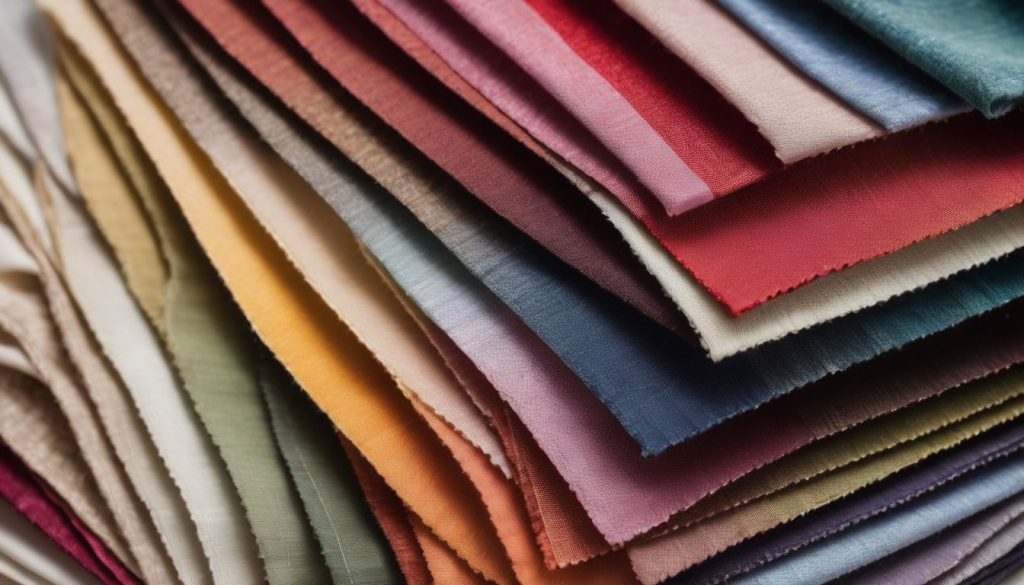
Have you ever shrunk your favorite sweater by accident? Wool fabric is tough but needs special care to keep it in top shape. Our guide will clear up the confusion on which fabrics need a trip to the dry cleaners and which don’t.
Keep reading for all the best tips!
Key Takeaways
- Professional dry cleaning is a must for fabrics like silk, velvet, wool, leather, linen, and suede to keep their quality and appearance intact.
- Home washing is suitable for cotton, knits, polyester and denim; each fabric comes with specific guidelines to prevent damage during the cleaning process.
- Special materials such as cashmere and furs require particular attention – opt for professional care or follow precise hand-washing instructions.
- Embellished items should be handled by professionals to protect intricate beadwork or sequins from being damaged in a standard wash.
- Always read the care labels on clothing thoroughly before attempting any cleaning; they provide vital information on maintaining fabric quality.
Fabrics That Need Professional Cleaning
Silk, velvet, wool, leather, linen and suede are all fabrics that require professional dry cleaning to maintain their quality and appearance. Keep reading to learn more about how to properly care for these delicate materials.
Silk
Caring for silk takes a gentle touch, as this luxurious fabric is known for its delicacy. It’s best to entrust your silk garments to professional dry cleaners who have experience with these sensitive materials and use eco-friendly solvents.
Such specialized care ensures the preservation of silk’s smooth texture and vibrant color without exposing it to harsh chemicals.
If you’re dealing with raw silk or high-end pieces like Douppioni and Crepe, professional garment care becomes even more important. These types of silk respond poorly to machine washing because of the intense agitation and heat they would face.
Handwashing is an option but requires meticulous attention so as not to shrink or damage the delicate fibers. Stick with a reliable cleaner for your delicate fabrics. Proper maintenance can dramatically extend the life span of your cherished silk items.
Velvet
Dry cleaning is essential for pure velvet garments to maintain their lush texture and rich color without causing damage. Different velvets demand specific care. It’s crucial to distinguish between them to ensure proper maintenance.
If you own a piece made from polyester or crushed velvet, gently place it inside a mesh washing bag before machine washing with cold water on the gentle cycle. This precaution helps prevent snags and tears during the wash.
For spills on velvet upholstery, act fast with just a damp cloth to wipe away messes easily. Thanks mainly to its durable and stain-resistant properties. Use cool water when hand washing delicate pieces and opt for detergents formulated specifically for delicates.
Following these procedures keeps your velvet items looking impeccable without risking harm to the fabric’s unique qualities.
Wool
Wool requires extra attention during the cleaning process. This natural, thick material can easily warp or shrink if not treated properly. For delicate garments like vintage coats or handmade blankets, hand-washing in cold or lukewarm water with a mild detergent is best.
Soak these items for just the right amount of time as per fabric care instructions to avoid any damage.
Always check labels before tossing woolens into the wash. They often provide crucial information on proper care. If your wool item says it’s machine washable, set your washer to a gentle cycle using a wool-specific detergent and choose a low spin option.
Be careful with drying – some woollen clothes can handle tumble drying while others must air dry flat to maintain their shape and texture. Moving onto fabrics that also demand caution – leather stands out as one needing specialist treatment.
Leather
Moving from the delicate care of wool to another professional cleaning necessity, leather requires specialized attention. Professional leather cleaning involves using specialized equipment and chemicals to remove dirt and stains effectively.
It is essential to allow leather items to air-dry naturally after cleaning, avoiding direct sunlight or heat sources as they could cause fading or damage. Regular upkeep includes wiping a leather jacket with a soft, dry cloth to remove surface dirt and keep it looking clean.
Periodic thorough cleaning not only ensures hygienic and safe-to-use apparel but can also be cost-efficient in the long run.
Linen
Linen can be safely dry cleaned or machine washed, unless the item is marked as “hand wash only.” It’s recommended to take linen garments to a professional dry cleaner who can use appropriate methods and chemicals for cleaning.
Dry cleaning doesn’t use water, which can ruin the texture of the fabric.
Linen that has been correctly manufactured and treated can be machine or hand washed, even tumble dried on low temperatures if needed. Depending on how it is applied, linen can be machine washed, hand washed, or dry cleaned; following care instructions ensures proper maintenance.
Suede
Suede, with its velvety texture, requires professional dry cleaning due to its porous material. It is recommended that suede be professionally cleaned at least once a year to maintain its appearance and durability.
Machine washing suede can damage the fabric, so it’s essential to seek out dry cleaning services that specialize in caring for this delicate material. For surface stains on suede shoes, a gentle cleaning solution such as suede shampoo and a nylon brush can be used for effective removal.
Additionally, regular light brushing of suede fabric every one or two weeks helps remove surface dirt and debris while maintaining its appearance.
Fabrics That Can Be Washed at Home
Cotton, knits, polyester, and denim are all fabrics that can typically be safely washed at home. However, it’s always important to check the care label on your clothing to ensure proper cleaning instructions are followed.
Cotton
Cotton can be easily washed at home using cold or lukewarm water in the washing machine. To maintain its durability, avoid over-drying cotton and ensure that it is not subjected to hot water, as this can cause shrinking.
By following these simple fabric maintenance tips, you can keep your cotton clothing looking fresh and vibrant for longer periods.
Maintaining cotton fabric involves using appropriate washing machine settings and choosing colder water temperatures to prevent shrinkage. It’s important to be mindful of fabric care by avoiding over-drying during the laundry process. Ultimately extending the life of your favorite cotton garments.
Knits
Knits, including wool and cotton blends, are washable at home using the gentle cycle on your washing machine or by hand. When caring for knits at home, always use a mild detergent and cold water to avoid shrinking or damaging the fabric.
Knit garments labeled as “dry clean only” can still be safely washed at home following the proper care instructions. For special materials like wool, it’s best to hand wash or take them to a professional dry cleaner to maintain their quality.
Remember that knits require delicate handling during cleaning due to their stretchy nature and sensitivity, so always refer to the care label for specific instructions on how to best maintain these fabrics.
Polyester and Other Synthetics
Polyester and other synthetic fabrics, such as nylon and acrylic, are generally safe for machine washing. Always check the care label for specific instructions on water temperature and other washing guidelines.
Most polyester blends can be laundered with warm or cold water, but it’s important to avoid hot water as it can cause the fabric to shrink or lose its shape. When it comes to drying, polyester should be air dried or tumble dried on low heat to prevent damage.
When polyester garments are dirty but don’t require a full wash, spot cleaning with mild detergent and water is an effective way to keep them fresh between washes. Avoid using bleach or harsh chemicals that could cause discoloration or damage to the fabric.
Denim
When it comes to caring for denim, it’s important to note that true denim should be washed sparingly to avoid fading. If your denim clothing says “dry clean only,” it should not be washed in the washer.
Instead, dry cleaners have experience cleaning sensitive fabrics like denim, ensuring they are handled with care and expertise. However, if your denim is ready for a wash, it is recommended to do so on the delicate cycle with cold water.
Remember that denim doesn\’t need washing after every wear – only when it gets dirty from stains, dirt, or odors.
Caring for Special Items
Ensure your cashmere sweaters and furs are properly taken care of. Additionally, learn how to handle embellished items and delicate or synthetic materials.
Cashmere
Cashmere is a luxurious and delicate fabric with its own antibacterial properties, which means it does not need frequent washing like synthetics. Most cashmere items can be dry cleaned according to the care label instructions, ensuring the fine fiber remains in top condition.
It’s best to avoid washing or dry cleaning wool and cashmere sweaters after every use as this can damage the yarns. When storing cashmere, folding rather than hanging is recommended to maintain its quality.
As for caring at home, hand washing or professional dry cleaning are preferred methods for maintaining cashmere garments due to their delicate nature. To prevent stretching or damage, it’s important not to wring or twist the fabric during drying but instead lay the sweater flat on a clean surface.
Furs
As we transition from caring for delicate cashmere to the special maintenance required for furs, it’s crucial to recognize that fur garments demand unique handling. When it comes to cleaning and storing furs, professional care is paramount.
Furs should not be exposed to heat and should be stored in cool temperatures with ample breathing space to maintain their pristine condition. Furthermore, avoiding friction and chemicals on fur pieces is essential in preserving their quality over time.
Professionals who specialize in fur care are equipped with the expertise needed to inspect each garment thoroughly before cleaning. They meticulously examine for stains, rips, tears, and other nuances before devising a tailored approach.
Embellished Items
Embellished items, such as beaded or sequined garments and hand-stitched accessories, often require special care due to their delicate nature. These ornate pieces should be sent to the dry cleaners for professional cleaning to ensure that the embellishments remain intact and undamaged.
Hand-stitched details can easily unravel in a standard washing machine, and the intricate beadwork or sequins may not withstand the agitation. By trusting these items to professional cleaners, you can maintain their beauty without risking damage.
When it comes to caring for bedazzled fashion or jeweled accessories, it’s vital to consider the fragility of these embellishments. Professional dry cleaning ensures that your adorned clothing and studded apparel receive gentle yet effective treatment while preserving their decorative elements.
Fragile or Synthetic Materials
Fabrics like chiffon, tulle, and rayon are delicate and should be handled with special care. Dry cleaning is recommended to preserve the quality of these sensitive materials. Similarly, certain synthetic fabrics such as PVC and polyurethane cannot withstand dry cleaning and may become damaged during the process.
It’s important to check the fabric label or consult a professional cleaner for the best care instructions for fragile or synthetic materials.
For natural fibers such as linen, wool, rayon, silk, viscose, lyocell, modal, and cupro that react poorly with water. Dry cleaning helps maintain their shape and texture. Using gentle cleaning methods will ensure that these fabrics retain their integrity over time.
Caring for Special Items
Handle furs, suits, pleated items, and more with care by following specific care instructions and always checking the labels before cleaning. For more tips on caring for special fabrics and garments, keep reading!
Tips for handling furs, suits, pleated items, and more
When handling furs, suits, or pleated items. Check the care label for specific dry cleaning instructions. Use a soft-bristled brush to gently remove surface dirt from fur. Then store it in a cool and dark place.
Suits should be brushed after each wear and professionally cleaned occasionally to maintain their appearance. Avoid hanging pleated garments for long periods to prevent permanent creases.
For fragile or synthetic materials, such as sequined or embellished items, spot clean stains with mild detergent before consulting a professional cleaner. When dealing with delicate pieces like silk or velvet, avoid direct heat and sunlight exposure during storage to preserve their texture and color integrity.
The importance of reading labels and following care instructions
Understanding and adhering to clothing care symbols and garment care instructions is crucial for maintaining the quality of special items and fabrics. The care labels on clothing provide essential guidance on how to properly care for different fabrics, ensuring their longevity.
By following proper fabric care instructions and washing guidelines, individuals can prevent damage to delicate materials and extend the lifespan of their garments. Therefore, it is imperative to pay close attention to laundry care labels and follow textile care recommendations to ensure proper fabric maintenance.
Proper fabric care involves reading clothing care symbols and garment care instructions carefully before washing or cleaning any item. This attention to detail not only preserves the integrity of the fabric but also prevents unnecessary wear or damage that could occur from improper handling.
Conclusion
In conclusion, caring for different fabrics is essential to maintain their quality and longevity. Knowing which fabrics should be dry cleaned and which can be washed at home can help you preserve your clothing items.
By following the care instructions on labels and understanding the specific requirements of each fabric, you can ensure that your clothes remain looking great for a long time. Taking the necessary steps to clean delicate materials properly will help you keep your wardrobe in top condition.
It’s important to handle each fabric with care according to its specific cleaning needs without compromising its integrity.
FAQs
1. How do I know if a fabric should be dry cleaned?
Check the care label on the garment for “dry clean only” or “dry clean recommended” instructions.
2. Can I hand wash fabrics that are labeled as dry clean only?
It’s best to follow the care instructions provided on the label and have items labeled as “dry clean only” professionally cleaned to avoid damaging the fabric.
3. Are there any fabrics that should always be dry cleaned?
Yes, delicate fabrics like silk, wool, velvet, and structured garments with linings often require professional dry cleaning to maintain their quality.
4. What are some common items that need to be dry cleaned?
Common items that often require dry cleaning include suits, formal wear, coats, curtains made of delicate materials, and silk or wool garments.
5. How do I store clothes after they have been dry cleaned?
Once collected from the cleaners, it’s best to remove plastic bags from clothing to allow them to breathe and hang them in a cool, well-ventilated space away from direct sunlight.

